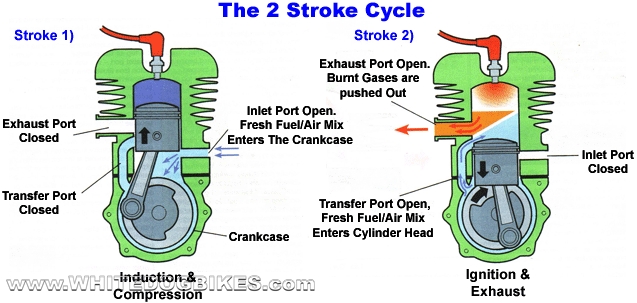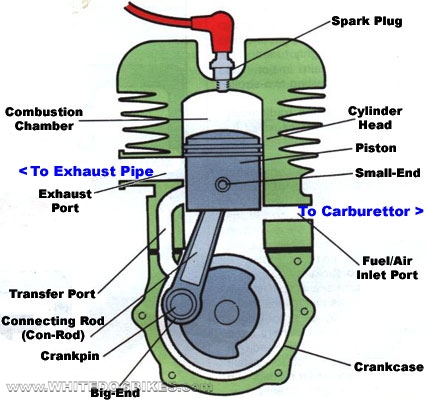A Very Basic 2 Stroke Engine
Please note-the diagram below represents a very simple version of a 2 stroke engine, in reality, they are a little bit more complicated!!!Engine Terminology
Stroke: Either the up or
down movement of the piston from the top to the bottom or
bottom to top of the cylinder (So the piston going from the
bottom of the cylinder to the top would be 1 stroke, from
the top back to the bottom would be another stroke)
Induction: As the piston
travels down the cylinder head, it 'sucks' the fuel/air mixture
into the cylinder. This is known as 'Induction'.
Compression: As the piston
travels up to the top of the cylinder head, it 'compresses'
the fuel/air mixture from the carburetor in the top of the
cylinder head, making the fuel/air mix ready for igniting
by the spark plug. This is known as 'Compression'.
Ignition: When the spark
plug ignites the compressed fuel/air mixture, sometimes referred
to as the power stroke.
Exhaust: As the piston returns
back to the top of the cylinder head after the fuel/air mix
has been ignited, the piston pushes the burnt 'exhaust' gases
out of the cylinder & through the exhaust system.
Transfer Port: The port (or
passageway) in a 2 stroke engine that transfers the fuel/air
mixture from the bottom of the engine to the top of the cylinder
The 2 Stroke Cycle
We have simplified this explanation as much as possible so some of the 'correct' terms have been replaced. There are many more factors which enable an engine to run, such as fuel/air ratios, ignition timing & shaped piston heads (extensively used in 2 stroke engines) but the explanation below outlines the basic differences between 2 & 4 stroke engine operation.
Stroke
|
Piston Direction
|
Actions Occurring during
This Stroke
|
Explanation
|
Stroke 1
|
Piston travels up the cylinder barrel
|
Induction & Compression
|
As the Piston travels up the barrel,
fresh fuel/air mix is sucked into the crankcase (bottom
of the engine) & the fuel/air mix in the cylinder
(top of the engine) is compressed ready for ignition
|
Stroke 2
|
Piston travels down the cylinder
barrel
|
Ignition & Exhaust
|
The spark plug ignites the fuel/air
mix in the cylinder, the resulting explosion pushes
the piston back down to the bottom of the cylinder,
as the piston travels down, the transfer port openings
are exposed & the fresh fuel/air mix is sucked from
the crankcase into the cylinder. As the fresh fuel/air
mix is drawn into the cylinder, it forces the spent
exhaust gases out through the exhaust port.
|
.gif)


No comments:
Post a Comment